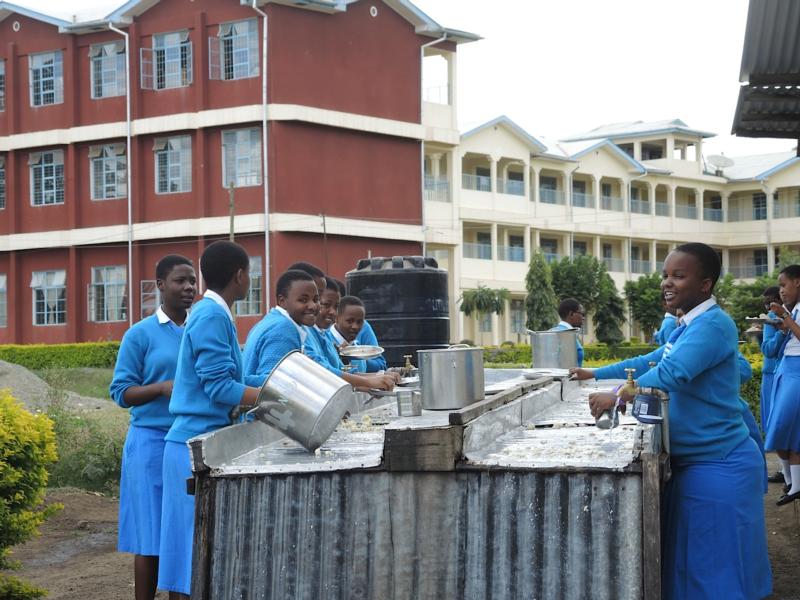
Students are seen in an undated photo taking turns with their chores, which include washing the dishes, cooking, and cleaning their rooms and bathrooms at Bishop Henry Gogarty Memorial School in Arusha, Tanzania. The girls secondary school is run by Our Lady of Kilimanjaro sisters, who grow maize, beans and leafy greens behind the dorms to feed students and staff. (CNS photo/Melanie Lidman, GSR)
by Melanie Lidman
MOROGORO, Tanzania (CNS) — Everyone knows how to stop the epidemic of teen pregnancies in Tanzania, where one out of every four babies is born to a woman under the age of 18.
It is one thing that politicians, teachers, sisters, priests, imams, police officers and activists all agree on. And its success has been proven by plummeting teen pregnancy rates everywhere it has been implemented.
The answer? Dormitories.
In so many places around the world, the challenge to lowering teen pregnancy rates is a complicated combination of social pressure, poverty and oppression of women. Tanzania suffers from all of those issues, but the country also has found a startlingly simple solution: Build a dormitory.
Construction of hostels for girls who are in secondary school is the single most effective strategy to combat teen pregnancy and early marriage, according to sisters, teachers and local activists. Girls are most vulnerable when on their way to and from school. While in transit, perhaps walking hours each way, they can become victims of sexual or physical violence.
They may start accepting rides from “boda bodas” (motorcycle taxi drivers) or older men who take advantage of young girls.
When girls live on a school campus, they are not at risk during transit. They also are able to concentrate fully on their studies, without the distraction of family obligations or chores.
The issue of dormitories for girls was even a major topic before the elections last October. The Chama Cha Mapinduzi ruling party’s vice president Samia Suluhu Hassan, the first woman vice president of Tanzania, frequently mentioned the topic during her stump speeches.
In Morogoro, nestled at the bottom of the Uluguru Mountains, the Tanzanian Catholic Association of Sisters runs the Bigwa secondary school for 360 female students. The students include about 80 sisters supported by the African Sisters Education Collaborative who did not complete secondary school before joining their congregations. The facility is a boarding school, attracting girls from all over the region.
Teachers at Bigwa believe the structure of boarding schools gives girls optimal learning conditions.
“Especially in our area, the environment for the girl students in their homes is they have to work very hard, cleaning utensils and cooking,” said Ibrahim Abdallah, who teaches Kiswahili and civics at Bigwa. Male students often don’t have to do the same amount of chores around the house, so they have more time to dedicate to homework and play. “A parent should remove these chores [from the girls] so they can study,” added Abdallah. Boarding schools still require students to do chores, sometimes cooking and cleaning for their classmates, but this is done in rotation so the students have plenty of time to dedicate to their studies or extracurricular activities like chorus.
“Most of the students who do boarding school continue with higher education,” explained Zenobia Ndonde, 18, who is studying in Form 5, the equivalent of 11th grade, at Bigwa. “When they go to government (public day) schools, usually they don’t finish. If they stay living at home, they usually drop out due to pregnancy.”
In Tanzania, secondary school is from grade 7 to grade 10. The next two years, 11th and 12th grade, are considered higher education, but also are necessary if someone wants to continue on to university.
Options are severely limited for girls who drop out.
“Some of my friends dropped out due to pregnancy, and they’re at home taking care of the children,” said Martha Louis Ntumbala, 20, who is studying Form 6. “Some of the girls just stay at home and take care of their families. Some girls are involved in immoral acts like prostitution, robbery and drug abuse. Some do small businesses like selling little buns or rice at the market. Others work as house girls for other families. Others do child labor; they’re looking for jobs in industries like sweeping and cleaning, moving things. Some of them walk around the streets and pick up bottles for recycling.”
There is one major obstacle to dormitories: money. Usually, the only schools that are able to construct dormitories are private ones. Tuition at the private Catholic schools in Tanzania is approximately U.S. $1,000 per year, including room and board. In a country where the average gross national income is $920 per year for a working adult, according to UNICEF, this tuition is simply unattainable. Private schools are only for the middle class, though the Catholic schools have scholarships for exceptional cases.
Many schools have acres of farmland on campus to keep costs down by producing their own food. Schools like the Bigwa School, as well as the Bishop Henry Gogarty Memorial Girls Secondary School in Arusha run by Our Lady of Kilimanjaro sisters, grow maize, beans and leafy greens behind the dorms to feed students and staff.
Widespread construction of dormitories at the free government schools is unlikely, because the dormitories require an immediate influx of money to build, not to mention operating costs like feeding all of the students and staff who are living on the campus. It was only in 2006 that the government made an effort to ensure that there was a secondary school in each district, so building dormitories at these schools is still far in the future.
The Tanzania Education Authority’s Education Fund counts girls’ hostels as one of their seven priority areas, in addition to books and supplies, teacher training, and scholarships for indigent female students, children with disabilities and orphans. But the fund itself must raise the money for hostel construction.
In districts that have built dormitories for the government schools, the results have been immediate. The village of Babati, Manyara Region in central Tanzania, spent funds collected from a national park in their district to build a girls hostel. The hostel immediately slashed teenage pregnancies among students from 10 per year to none, according to a Guardian article. A school official said the hostel made such a difference for girls in their studies that they wanted to build one for boys as well. Another education official in the Handeni District, near the northern coast, said they had 66 cases of student pregnancies in 2014 and just seven in 2015, after the hostel was constructed.
The Evangelizing Sisters of Mary have a school near the coastal city of Bagamoyo, in a heavily Muslim area. They do not have dormitories for students studying in their vocational school’s tailoring program, which has made retaining students for the full two-year program difficult. Last year’s graduating class started with 12 students, but only three graduated.
“They don’t tell us they’re leaving,” said Sister Evelyne Kokujangisa, director of the school. “If they see us on the road, they’ll hide. Or they’ll tell us they’re learning computers in Bagamoyo, but actually they’re dropping out to get married.”
Whenever a student does tell them she is leaving to get married, the sisters try to run intervention. “We call the parents for a meeting or visit them to talk and try to get them to stay,” Kokujangisa explained. “We tell the girls, ‘A man won’t help you all your life; you need to depend on yourselves.’ But parents are the ones who are encouraging the girls to get married.”
Teens who become pregnant are technically able to continue learning, though social shame makes this rare.
The U.N. has programs to try to encourage young parents to go back to school, and in 2015 helped 150 teen parents graduate from vocational school. But the best way to improve Tanzania’s abysmal graduation rate is to make sure that girls have the tools to stay in school and avoid teen pregnancy in the first place.
In development work, the emphasis on education for girls is called the “gender dividend.” “If you promote gender equality and the empowerment of women, you can see an impact on society as a whole,” said Anna Collins-Falk, the country director of U.N. Women, the United Nations Entity for Gender Equality and the Empowerment of Women. “Empowered women participate, they influence, they bring about change, not only in themselves but in society as a whole.”
Paul Mbunda, a geography and history teacher at Bigwa, agreed. “There are a lot of challenges due to African traditions, because in our society boys are given more chances to be educated than girls,” he said. “To me, girls are more intelligent than boys. When you give them good conditions to learn, they can do anything. But you need to have the forces to direct them. If you give them [too much] freedom, they’ll do nothing.”
“When you educate a woman, you educate the whole society because, these are the ones who raise the family,” he said.






